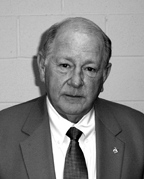 | Steve Shaffer served in the U.S. Army from 1964 – 1966. After serving his country Steve continued giving back by serving as a Law Enforcement Officer for 25 years, retiring in 1992. While working as a Law Enforcement Officer Steve continued his education at WSU where he earned a Masters Degree in 1975. He has attended numerous workshops relating to Anger Management, Domestic Violence, Psychotherapy, Addictions Counseling, and with Ethics and Professional Development. Steve worked in addiction counseling for the past 6 years. In 2003 Steve started his own drug & alcohol outpatient treatment program, called A New Dimension you may visit him at 2422 S. Seneca Ste. A or he can reach by calling 265-8600 |
Rehabilitation and Therapy
2007-05-01 13:27:00
Positive steps for an intervention
What is a drug and alcohol intervention and what steps should be taken to ensure a positive outcome?
An alcohol or drug intervention
is a necessary process to help an addict (regardless of the addiction) recognize the extent of their problem. Individuals who are addicted to drugs or alcohol usually don’t recognize their addiction is out of control (denial). They tend to look at those around them as a measure of how right or wrong their behavior is. They normally surround themselves with individuals “friends” that are a mirror of themselves, leading them to believe that their own actions are acceptable.
Remember that an individual who is suspected of having a substance abuse problem will almost always try to minimize their use, change the topic, or joke about their use. Expect to hear things such as “My use is no worse than anyone else’s.” or “If it wasn’t for (any reason) I would not have a problem”
The sole purpose of an intervention is for the person to accept the reality and severity of his or her addiction and to seek help. The process of conducting a drug intervention is a difficult and sensitive task. It is important that it is done correctly; or the individual could feel cornered and become defensive. Advice from a trained professional is useful in determining the proper strategy and timing for your specific intervention.
Steps for a successful intervention
1. Stop the “rescue missions.” Friends or family often try to protect an abuser from the results of their behavior by making excuses to others and by helping them out of any crisis their addition may have caused. It is important to stop all such rescue attempts immediately, so that the addict will fully experience the harmful effects of his use and thereby become more motivated to stop.
2. Don’t enable (help) them. Sometimes family members feel sorry for the person or tend to avoid them altogether. This comes across to the abuser as a reward—after all; all he or she wants is to be left alone. Be careful not to help by paying their bills, bailing them out of jail, letting them stay for rent free, etc.
3. Time your drug abuse intervention. If possible, plan to talk with them when they are sober. Choose a time when everyone is in a calm frame of mind and when you can speak privately.
4. Be specific. Tell them that you are concerned about their drug or alcohol abuse and want to be supportive in getting any help needed. To substantiate your concerns use examples of the ways in which their drug abuse has caused problems for the ones that care the most, including any recent incidents.
5. Establish consequences. Tell them that until he or she gets help, you will carry out a defined course of action. This is not to punish the abuser, but to protect yourself from the harmful effects of the abuse. These may range from refusing to be with the person when they are under the influence, to having them move out of the house. DO NOT make any threats you are not prepared to carry out. The basic intention is to make the abuser’s life more uncomfortable if he continues using drugs than it would be for him to get help.
6. There are strength in numbers, use the help of other family members, relatives and friends to confront the abuser as a group. However, you want to choose one person to be the key spokesperson. It will be much more effective for the others to simply be there nodding their heads, than it would be for everyone to talk at once and “gang up on him.” Remember the goal is to get him or her clean and sober. Not to embarrass or humiliate them.
7. Listen. If during your drug abuse intervention the abuser begins asking questions like; where would I have to go? For how long? This is a sign that he is reaching for help. Do not directly answer these questions. Instead have them call and talk to a professional. Support them, don’t wait. Once you’ve gotten his agreement, get him admitted immediately. Support at this junction is so important, as this is only the first of many steps in recovery.


